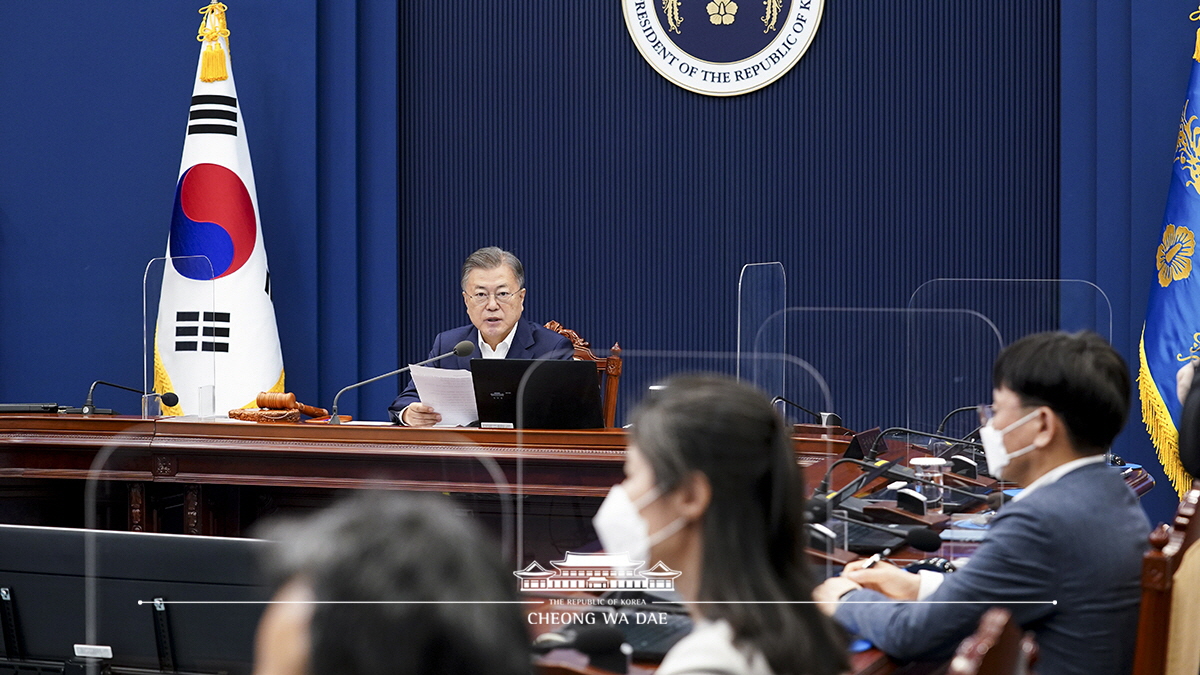이 웹사이트는 제19대 대통령 임기 종료에 따라 대통령기록관이 「대통령기록물 관리에 관한 법률」에 의해 이관받아 서비스하는 대통령기록물입니다. 자료의 열람만 가능하며 수정 · 추가 · 삭제는 불가능합니다.
다만, 「개인정보보호법」에 의하여 개인의 정보를 보호받기 원하시는 분은 관련 내용(요청자, 요청내용, 연락처, 글위치)을 대통령 웹기록물 담당자(044-211-2253)에게 요청해 주시면 신속히 검토하여 조치해 드리겠습니다. 감사합니다.
SPEECHES & REMARKS
BRIEFINGS

Let me begin the 15th Cabinet Meeting.
Prices of energy, raw materials and grains are sharply rising across the world as the Ukraine war drags on and supply chain uncertainties persist. Consequently, major countries are all recording their highest inflation rates in three to four decades. Korea’s annualized inflation rate has also gone over four percent, the highest in 10 years, but the figure is still relatively low. The Government has been going all out to stabilize prices, but we must all do everything possible, doubling down on our determination to minimize the impacts of external risk factors on the domestic economy and get grocery prices under control.
The Government has announced additional measures to help keep prices stable. These include further increasing the tax cut on petroleum products, providing fuel subsidies for truckers and expanding the number of items subject to quota tariffs. I urge the relevant ministries and agencies to implement follow-up measures as promptly as possible and make special efforts to support low-income earners and the most vulnerable in society, for their hardships will be particularly exacerbated by price hikes.
The Omicron wave has passed its peak and declined steadily over the past three weeks, sparking greater expectations for a return to normal life. Moreover, the international community forecasts that Korea will become one of the first countries to downgrade COVID-19 to an endemic disease, noting our strategy for a return to normalcy.
Our country has protected the people’s lives and safety from this infectious disease relatively well compared to the track records of other countries. Even during the recent spike in Omicron cases, we have been able to keep our medical system from being overwhelmed. This has allowed us to keep the number of severely or critically ill patients and the fatality rate at lower levels than those recorded elsewhere.
Our attainments can be primarily attributed to our people, who have actively participated in and cooperated with the epidemic prevention and control measures as well as the vaccination program. Other success factors include Korea’s advanced response to the pandemic and our excellent healthcare and medical capabilities.
While focusing on managing high-risk groups, the Government will prepare for a return to normalcy in an orderly manner. For example, we will reorganize our emergency systems for fighting the spread of the disease and providing medical treatment so that we can respond to people’s medical needs as we did pre-pandemic times. With most of the anti-epidemic measures to be lifted, I’d like to ask our people to join forces for a swift, complete recovery of our daily routines while furthering individuals’ responsibility for their own epidemic prevention and control efforts.
Even during a prolonged war against COVID-19, the Government has made every effort to respond to avian flu, African swine fever and other infectious diseases of livestock. From early on, my Administration has been strengthening the livestock epidemic prevention system and has gone all out to contain the spread of these diseases by acting quickly and applying strong anti-epidemic measures.
Livestock farmers also joined forces while abiding by the epidemic prevention and control rules. As a result, the number of avian flu cases has fallen to under half that recorded last winter, and the slaughter of layer chickens has been slashed by 75 percent. There has not been even a single case of African swine fever in hog farms since October of last year, thanks to the stronger anti-epidemic measures taken on those farms. These include an intensive drive to install fences to keep wild boars out and to capture them.
This achievement was made possible by raising the nation’s capabilities to respond to infectious diseases for livestock. It is attributable to the arduous work and dedication of officials at the relevant ministries and agencies as well as local governments, livestock farmers and the related industries. In particular, despite the cold winter weather, much hard work was done on the anti-epidemic frontlines, including blocking the movement of people and animals to prevent contagion, disinfection and testing. I appreciate the dedication and hard work of everyone involved and wish to express my special gratitude.
Livestock infectious diseases can occur and spread anywhere, at any time. Now is not the time for complacency, as not all the migratory birds have yet flown north, and infected wild boars are moving south with their activity increasing in spring. I ask the relevant ministries and agencies to not let their guard down and continue to do everything they can.



